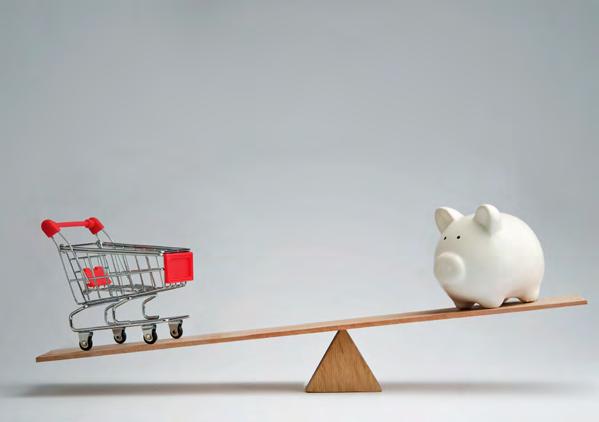
5 minute read
THRIVING OR SURVIVING? HOW DO SASKATCHEWAN HOUSEHOLDS FARE COMPARED TO THE REST OF CANADA?
THRIVING OR SURVIVING?
HOW DO SASKATCHEWAN HOUSEHOLDS FARE COMPARED TO THE REST OF CANADA?
This article was written and originally published by CPA Canada and has been republished by CPA Saskatchewan with permission and amended to include regional data.
A recent survey conducted by the Chartered Professional Accountants of Canada (CPA Canada) indicates that many Canadians are treading water financially after more than two years of pandemic and economic turmoil. The Thriving or Surviving study uncovers the kitchen table issues that confront Canadians daily, revealing how the country is coping with concerns such as debt, savings, emergency funds and financial literacy. Overall, roughly 27% of Canadians feel worse off financially than they did a year ago, while approximately 35% of Saskatchewanians/Manitobans report feeling worse off financially. Meanwhile, 34% of Canadians are optimistic that they’ll be better off financially a year from now whereas only 28% of Saskatchewan/Manitoba respondents feel this same optimism. Money-related stress remains high, with 65% of Canadians agreeing that they worry about money, with roughly 63% of those located in Saskatchewan/Manitoba feeling the same.
DEBT IS CAUSING FINANCIAL FRIGHT
Almost half (49%) of Canadians have debt and 68% of those with debt are “concerned” about it, while in Saskatchewan/ Manitoba, 45% reported having debt and 66.5% of respondents were “concerned” about it. One-in-four Canadians have carried forward a credit card balance in the past year and a similar proportion (23% of Canadians vs. 25% of Saskachewanians/Manitobans) plan to do this over the next month. Other debt debacles include:
• More than half of Canadians (61 per cent) who have borrowed money to cover day-to-day expenses over the last two years have yet to pay it back. Saskatchewan/
Manitoba responses were consistent with this. • Nearly half of Canadians (45 per cent) have borrowed some money over the past year. Of this group, 22 per cent have borrowed from banks and 18 per cent have borrowed from family. A whopping three-in-five (58% of Canadians and 62% of Saskatchewanians/Manitobans) of those who are under the age of 65 and have a mortgage or other debts don’t think it will be paid off by the time they turn 65. “Being in debt is frightening and can make you feel like there’s no way out – but there is,” said Doretta Thompson, CPA Canada’s financial literacy leader. “If you are struggling financially, there’s no shame in asking for help and there are several free CPA Canada financial literacy resources and non-profit organizations that exist to help Canadians thrive financially.”
CANADIANS ARE ON THIN ICE FINANCIALLY
When it comes to emergency funds and savings, The Thriving or Surviving study found that Canadians are cutting it fine. Strikingly, half (50 per cent) of the country would not be able to come up with $2,500 in a pinch. Almost two in five (38 per cent) can’t come up with $1,000 and about one-in-four (26 per cent) can’t even come up with $500 during an emergency without borrowing or selling something. Additionally, only a little over half of Canadians (54 per cent) say they have an emergency fund stashed away. Meanwhile, saving money was mentioned most often as a cause of financial stress for 47 per cent of Canadians; respondents cited they are saving 10 per cent of their after-tax income on average and as many as one third of Canadians are not saving anything after taxes.
MAKING THE GRADE
Despite walking a thin line financially, 78 per cent of Canadians graded themselves an ‘A’ ‘B’ or ‘C’ on their financial report cards and feel confident they have the knowledge and skills needed to make the right choices when it comes to saving, managing debt, investing and budgeting. Here’s how the country nets out when asked to assign themselves a letter grade based on their personal financial skills:
• Nearly 62% of Canadians end up in the middle (versus 70% in Saskatchewan/Manitoba) – 31% of mark themselves with a B and an equal number grade themselves a C. In Saskatchewan/Manitoba, 37.4% mark themselves with a B and 32% gave themselves a C. • Giving themselves top marks with an A is 16 per cent across Canada as well as in Saskatchewan/Manitoba. • Just 8% of Canadians admit they are failing (F grade) with only 4.2% of those in Saskatchewan/Manitoba giving themselves a failing grade. “There appears to be a disconnect between Canadians’ financial behaviours and how confident they feel about their financial skills and knowledge,” continued Thompson.
“Most believe they have the knowledge to make the right decisions when it comes to personal finances, but some key indicators around the state of debt and savings point in a different direction.”
To learn more about this study, please visit click here.
WHAT DO YOU FIND STRESSFUL ABOUT MANAGING YOUR MONEY?
40%
35%
30%
25%
20%
15%
10%
5%
0% Home repair/ renovation/ maintenance Inflation/ rising costsNot applicable – I am not stressed about managing my money Other (Specify)Saving/planning for retirementKeeping up with peersA ordable childcareCosts of having a babyHome ownershipContinuing to support an adult childHelping to support aging parents Being able to a ord programs for my kidsPaying o my debts/ Paying o partner’s debts InvestingSaving moneyRemembering to pay all of my bills on timeMaking sure I can a ord the necessities
ECONOMIC BRIEFING OCTOBER 2022 – A CLOSE LOOK AT INFLATION
In his latest Economic Briefing, CPA Canada Chief Economist David-Alexandre Brassard presents insights on inflation through both a consumer and a business lens. CPA Canada’s Economic Briefings provide ongoing coverage of the state of the Canadian economy. Research, Guidance and Support: David-Alexandre Brassard, Chief Economist. research@cpacanada.ca

HOLIDAY SPENDING SURVEY RESULTS
CPA Canada’s holiday spending survey results are in and we’ve compiled some of the noteworthy results for the Saskatchewan/Manitoba region! • 64% of SK/MB respondents indicated that inflation will make it more difficult to buy holiday gifts this year • 78% said that they still plan to spend the same amount or more than they did last year • 63% said they haven’t saved during the year to help pay for holiday gifts • A whopping 32% of respondents in SK/MB reported that they are either very likely or somewhat likely to take on debt to pay for their holiday gift purchases • Nearly half (49%) planned to buy gifts online during Black Friday sales Click here to view the Canada-wide results including the study background document.








